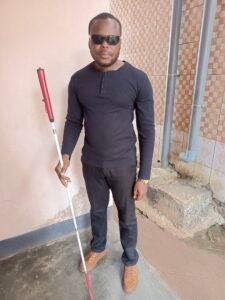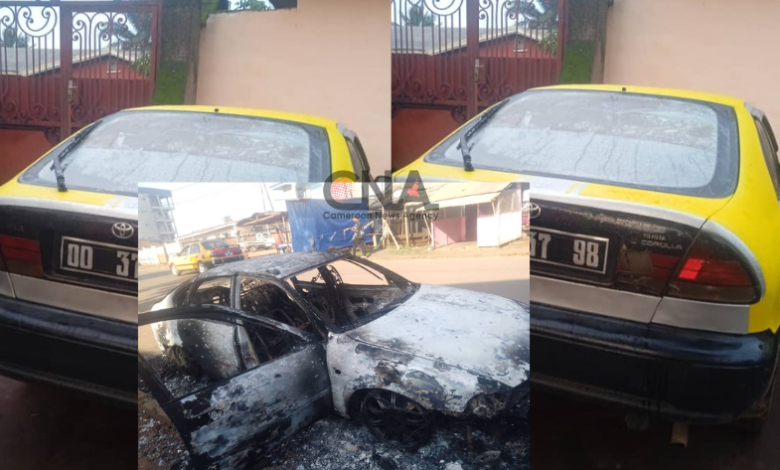by Princely Kesah, Cameroon
Government forces and separatist fighters have not stopped exchanging gunshots for nearly eight years of conflict in Anglophone Cameroon, but of recent, it is not the constant gun battles filling faces of blind people with tears in Bamenda, capital of the country’s northwest region. It is a war of taxi colours which the blind community says is deadlier than the violent conflict which most of them have lived ever since fighting erupted between the two camps.
How persons with visual impairment would have to detect a taxi colour before stopping it for a ride is the new equation hundreds of them are now compelled to solve if they must go about their daily activities in Bamenda. A recent move by a separatist group, the Ambazonian Defence Forces (ADF) compels every township commercial taxi to paint their vehicle blue and white instead of the traditional yellow which drivers have known and used for decades. Blue and white are colours of Ambazonia, a breakaway state they fight to create. The ADF call to taxi drivers in the city is met with a brutal counter reaction from the country’s government which would not fold its arms and watch such a drama when it has previously repeated that no inch of its territory would be lost to separatists.
This new twist means commercial township car owners would have to choose whether to maintain the traditional yellow colour instituted by the government, or switch to ADF’s requested Blue and white. Whatever the outcome, city dwellers with visual impairment are already feeling the heat. Not even objections from majority factions of the separatist movement are enough to stop the ADF’s decision.
The past weeks have been characterised by drama from both Government soldiers and ADF fighters who have taken the war from the exchange of gunshots to the exertion of control over nearly ten thousand commercial taxi drivers in Bamenda. While every blue and white vehicle is immediately impounded and the driver arrested by the regular army, those with yellow certainly have had to pay a heavier price: ADF forces attack and set the cars on fire, and the latest victim according to local media reports is a mobility impaired person who lost his taxi to fire and has been wailing inconsolably. “I would rather be killed than live without my car,” Joseph Fru said, explaining that
his existence largely depends on it.

The taxi Colour War, described by many as senseless and inhumane, has launched visually impaired people in the town into a sea of anxiety, isolation and trauma. In the last 8-years, the bloody conflict in Anglophone Cameroon has dragged the blind population into precariousness, a situation now worsened by the “senseless” Taxi Colour War.

Even short distances that sighted persons would cover on foot, Francis, just like many of his visually impaired peers are compelled to bud a cap. This is partly due to bad roads marked by port holes, © open covets, poorly designed road signs, etc. Insecurity also accounts for the reason taxis are preferred over going on foot even on short distances. “Shooting can start any time and for a blind person to be caught in such a situation is very depressing,” Francis says, insisting he would rather use his last dime on taxi than trek in certain areas.
Since narrowly cheating death after a taxi transporting him was almost burned by separatist fighters, Francis would rather send someone than go on running his own errands. “I was in a taxi when a good Samaritan stopped our car and informed the driver that separatist fighters were setting yellow cars on fire few metres ahead of us,” maybe I would have been dead, he laments.
Peter Gong Tonain, President of Hope Social Union for the Visually Impaired (HSUVI), the largest organisation of the blind in Bamenda reveals that he has been so disturbed in his spirit ever since the Taxi-colour war broke out in the city. He says it is a moment of pain to his community, stressing they had not finished bearing the heat of the raging conflict when the taxi colour dilemma met them at their door steps. “I don’t see in anyway how painting taxis blue and white would deliver independence. This is only wickedness,” he laments.
Peter says the safety of blind people like himself, is imperilled. “We are not safe being in Bamenda because whether yellow or Blue and white taxis, either government soldiers and separatist fighters will hunt us down. We are in the middle of nowhere,” he says, his eyes heavy with tears
The current atmosphere of confusion in Bamenda adds to numerous ghost towns and lockdown operations which the population has had to endure since 2017, with disabled persons among the most affected. Most of them have completely lost their means of livelihood, while others who were enrolled in schools before the conflict have dropped out, amidst the unending hostilities. The taxi headache has only added salt to injury, as International Humanitarian Laws applicable during conflict are violated with impunity.
According to Francis and Peter, the Taxi Colour War is gradually eroding the dignity, identity and independence of visually impaired persons in Bamenda. “Before, we only had to struggle with the inaccessible nature of the environment, but this war has completely immobilized us.” Blind people in Bamenda say they have laid several complaints at the feet of those who have the authority to bring the “senseless” war on taxis to a close, but their complaints have been ignored. “Someone needs to come to our rescue quickly,” Peter urges.
